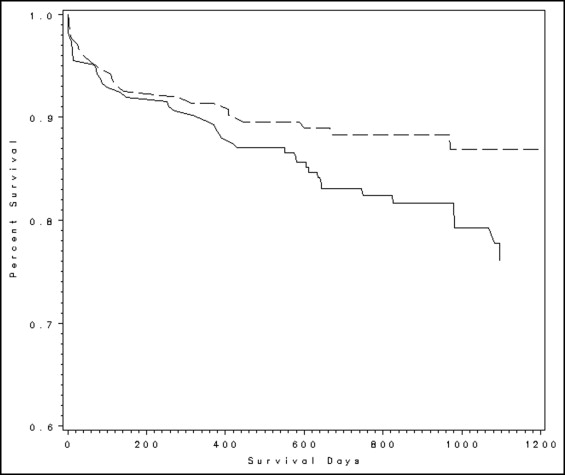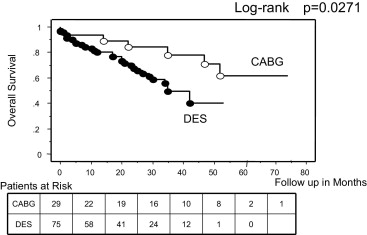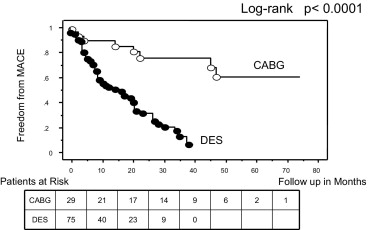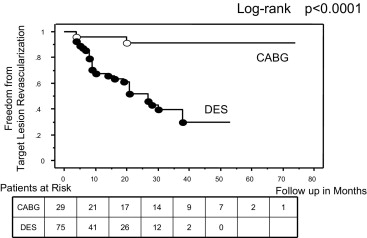CABG is associated with better survival than PCI with DES in patients with non Hemodialysis Dependent (HD) Chronic Kidney Disease (CKD) and multivessel CAD, but CABG patients have a greater short-term risk of needing permanent hemodialysis.
A new study, published in the American Journal of Cardiology, compared the short- and long-term outcomes of coronary artery bypass grafting (CABG) and percutaneous coronary intervention (PCI) with drug-eluting stents for multivessel CAD among non-hemodialysis-dependent (HD) patients with CKD.
Table: Risk factors associated with increased mortality after revascularization in patients with non-hemodialysis-dependent (HD) chronic kidney disease (CKD) and those with end-stage renal disease:
| Variable | HR | 95% CI |
| Non-HD CKD (2-vessel disease) | ||
| Coronary artery bypass grafting | 1.1 | 0.5–2.3 |
| Age >65 years | 3.5 | 1.5–8.6 |
| New York Heart Association class III or IV | 2.9 | 1.3–6.4 |
| Previous cerebrovascular disease | 3.9 | 1.9–8.2 |
| Non-HD CKD (3-vessel disease) | ||
| Coronary artery bypass grafting | 0.6 | 0.4–1.0 |
| Previous myocardial infarction | 3.2 | 1.9–5.4 |
| History of neoplasm | 1.8 | 1.0–3.1 |
| Peripheral vascular disease | 2.2 | 1.4–3.7 |
| End-stage renal disease | ||
| Coronary artery bypass grafting | 0.8 | 0.3–1.8 |
| Age >65 years | 2.8 | 1.3–6.1 |
| New York Heart Association class III or IV | 7.1 | 2.3–22.6 |
In all three groups of KD, only CABG resulted in better outcomes, while advancing age, heart & peripheral vascular disease (as expected) were independent risk factors for increased mortality.
Comparison of survival after CABG (dashed line) or PCI (solid line) in patients with non-HD CKD and 3-vessel disease:

Conclusion: In patients with non-HD CKD and multivessel CAD, CABG led to better survival than PCI with drug-eluting stents, but CABG patients had a greater short-term risk of requiring permanent hemodialysis.
Remarks: Chronic kidney disease is associated with an increased risk of atherosclerosis and a worse prognosis. The risk of cardiovascular events and death increases as the GFR decreases, reaching a peak in End-stage renal disease (ESRD) patients who require hemodialysis. In patients with severe coronary artery disease, revascularization procedures appear to provide benefit over medical therapy alone.
Although PCI with drug-eluting stents is associated with a lower risk of revascularization, lower risk of major adverse cardiovascular events, and better long-term survival than PCI with bare-metal stents, this study once again showed improved long-term survival with CABG in patients with non-HD CKD and 3-vessel CAD, mirroring the results of studies done in the general population of coronary revascularization patients.
Another important finding of this study—the first to compare the rates of hemodialysis dependence in patients with non-HD CKD who have undergone CABG or PCI—was that CABG was associated with a greater rate of postprocedure hemodialysis dependence than was PCI. This association was not surprising, because fluid shifts and the use of cardiopulmonary bypass during CABG predisposes patients with CKD to worsening renal function.
Untill recently, Off-Pump Coronary Artery Bypass Surgery (OPCAB), although avoiding these factors, has thus far not been proven to offer a benefit over On-Pump CABG (ONCAB). However, in a small but significant study published inThe Annals of Thoracic Surgery, Sunagawa and colleagues examined 104 consecutive patients with hemodialysis in their institution between January 2002 and June 2006. Twenty-nine patients were treated by CABG (CABG group) and 75 patients by percutaneous coronary intervention (PCI) with DES (DES group). In the CABG group, the off-pump technique was used in 83%. In the CABG group, there was 1 death, in the DES group 3 deaths.
Freedom from all-cause death. (CABG = coronary artery bypass surgery; DES = drug-eluting stent.):

Freedom from MACE. (CABG = coronary artery bypass surgery; DES = drug-eluting stent; MACE = major adverse cardiac events.):

Freedom from target lesion revascularization. (CABG = coronary artery bypass surgery; DES = drug-eluting stent.):

The latter data reflect my own opinion that in the right hands, using the newer stabilization techniques available, the avoidance of Cardio Pulmonary Bypass will result in better outcomes for CABG in this sub group of patients. DES use seems to offer even less benefits than in the other data presented here.
1): Short- and Long-Term Outcomes of Coronary Artery Bypass Grafting or Drug-Eluting Stent Implantation for Multivessel Coronary Artery Disease in Patients With Chronic Kidney Disease, Guha Ashrith, MD, et al.,Am J Cardiol. 2010 Aug 1;106(3):348-353)
2): Coronary Artery Bypass Surgery Is Superior to Percutaneous Coronary Intervention With Drug-Eluting Stents for Patients With Chronic Renal Failure on Hemodialysis, SUNAGAWA ET AL Ann Thorac Surg 2010;89:1896–900


Leave a Reply